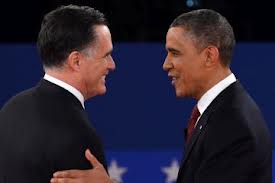 After a poor performance in the first presidential debate two weeks ago, President Barack Obama came back strong in the second one, winning perceived victories over Mitt Romney in two instant-reaction polls — one of debate-watching registered voters, the other of debate-watchers who went into the debate uncommitted to either candidate.
After a poor performance in the first presidential debate two weeks ago, President Barack Obama came back strong in the second one, winning perceived victories over Mitt Romney in two instant-reaction polls — one of debate-watching registered voters, the other of debate-watchers who went into the debate uncommitted to either candidate.
A CNN survey of registered voters who watched the debate found that 46 percent said Obama won the debate and 39 percent said Romney did. The survey’s margin of error was four percentage points.
After a weak performance in the first debate, Obama outperformed expectations in the second: Seventy-three percent of respondents said Obama did better than they expected, 10 percent said he did worse, and 16 percent said he did about the same as expected. Romney, who had a much stronger performance than Obama did in the first debate, performed closer to expectations: 37 percent said he did better than expected, 28 percent said worse, and 33 percent said he performed the same.
Romney performed better on convincing respondents that he has a clear plan for solving the country’s problems: 49 percent said Romney did and 50 percent said he did not. Only 38 percent said Obama did, and 61 percent said he did not.
Respondents favored Romney on a variety of issues, including the economy (58 percent to 40 percent over Obama), taxes (51 percent to 44 percent) and the budget deficit (59 percent to 36 percent). Romney held a narrower advantage on health care, 49 percent to 46 percent. On foreign policy, 49 percent said Obama would handle it better and 47 percent said Romney would.
Obama and Romney split the advantage on more intangible measures. Romney took a slight (49 percent to 46 percent) advantage on being a stronger leader, while Obama scored points for being more likable (47 percent to 41 percent) and caring more about the audience (44 percent to 40 percent). Forty-five percent of respondents said Romney answered questions more directly and 43 percent said Obama did, while 49 percent said Obama spent more time attacking his opponent and 35 percent said Romney did.
The debate was unlikely to change many minds among CNN’s respondents: 25 percent said they were more likely to vote for Obama after the debate and 25 percent said the same about Romney. But 48 percent said they weren’t more likely to vote for either one. Debate watchers generally are more likely to be paying close attention to the campaign and more likely to already be committed to a candidate than the general population.
According to CNN’s Wolf Blitzer, the sample was composed of about 33 percent Democrats and 33 percent Republicans, or about 8 percentage points more Republican than the average of all CNN polls in 2012 among all adults (not registered voters specifically). CNN surveyed 457 registered voters who had participated in a poll earlier this week, said they watched the debate, and had agreed to be re-interviewed for the post-debate poll. The margin of error of the poll is 4.5 percentage points.
A CBS News poll conducted using an online panel of uncommitted voters found a 37 percent plurality said Obama won the debate, while 30 percent said Romney did and 33 percent said it was a tie.
Romney came into the debate with a big advantage on the handling the economy among the CBS respondents, and Obama was able to close that gap slightly. Before the debate, 71 percent of respondents said Romney had the edge on handling the economy and 27 percent said Obama did. After the debate, that narrowed somewhat to a 65 percent to 34 percent advantage for Romney.
Obama held the advantage on better handling the middle class, 56 percent to 43 percent. Fifty-five percent of poll respondents said Obama gave direct answers to questions, while 49 percent said the same about Romney.
The CBS News post-debate polls are conducted using the GfK KnowledgePanel, a representative Internet panel. CBS surveyed 525 uncommitted voters who watched the debate, for a four percentage point margin of error. The CBS defines uncommitted voters as those who are totally undecided before the debate or who were leaning to a candidate, but said they may still change their minds. The survey sample was composed of 56 percent who described themselves as independents, 23 percent Democrats and 21 percent Republicans.
Microsoft Xbox, working in partnership with the the polling company YouGov, conducted a live poll among more than 30,000 respondents who tuned in to watch the debate and answered survey questions via Xbox Live’s election channel.
The Xbox sample was neither randomly selected nor scientifically projective of any larger population, and the adult participants skewed heavily younger and male.
However, the sheer size of the participant pool allowed the Xbox/YouGov pollsters to isolate 988 respondents who said they were completely undecided before the debate, and they judged Obama the winner by a 51 percent to 17 percent margin. After the debate, most remained undecided, but 28 percent said they now will vote or lean to Obama, while just 10 percent said they will vote for Romney.
Surveys from CBS and CNN, plus a Democracy Corps/Women’s Voices Women Vote focus group, found that the first debate was a resounding victory for Romney among uncommitted voters as well as debate-watchers more generally. Since that debate, national polling has trended broadly toward Romney, and the current HuffPost Pollster estimate shows the two candidates essentially tied, with Romney at 47.1 percent and Obama at 46.9 percent.
Huffington Post

Leave a Reply
You must be logged in to post a comment.